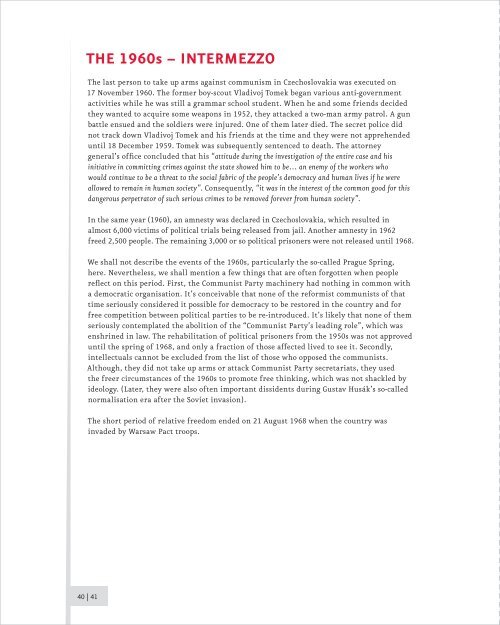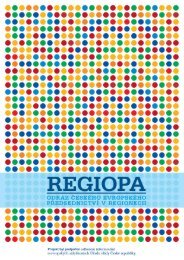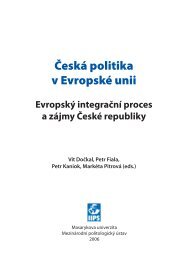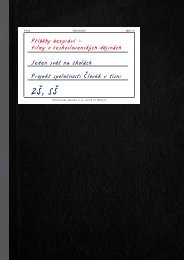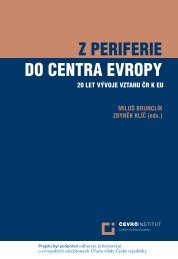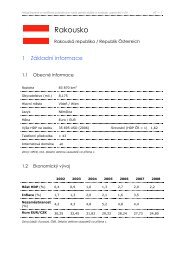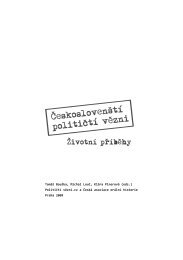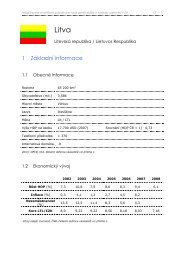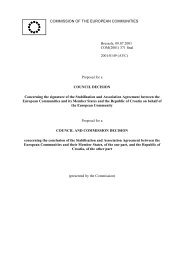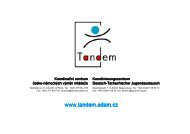CESTA KE SVOBODÄ PÅÃBÄHY BEZPRÃVÃ - Euroskop.cz
CESTA KE SVOBODÄ PÅÃBÄHY BEZPRÃVÃ - Euroskop.cz
CESTA KE SVOBODÄ PÅÃBÄHY BEZPRÃVÃ - Euroskop.cz
- No tags were found...
Create successful ePaper yourself
Turn your PDF publications into a flip-book with our unique Google optimized e-Paper software.
THE 1960s – INTERMEZZOThe last person to take up arms against communism in Czechoslovakia was executed on17 November 1960. The former boy-scout Vladivoj Tomek began various anti-governmentactivities while he was still a grammar school student. When he and some friends decidedthey wanted to acquire some weapons in 1952, they attacked a two-man army patrol. A gunbattle ensued and the soldiers were injured. One of them later died. The secret police didnot track down Vladivoj Tomek and his friends at the time and they were not apprehendeduntil 18 December 1959. Tomek was subsequently sentenced to death. The attorneygeneral’s office concluded that his “attitude during the investigation of the entire case and hisinitiative in committing crimes against the state showed him to be… an enemy of the workers whowould continue to be a threat to the social fabric of the people’s democracy and human lives if he wereallowed to remain in human society”. Consequently, “it was in the interest of the common good for thisdangerous perpetrator of such serious crimes to be removed forever from human society”.In the same year (1960), an amnesty was declared in Czechoslovakia, which resulted inalmost 6,000 victims of political trials being released from jail. Another amnesty in 1962freed 2,500 people. The remaining 3,000 or so political prisoners were not released until 1968.We shall not describe the events of the 1960s, particularly the so-called Prague Spring,here. Nevertheless, we shall mention a few things that are often forgotten when peoplereflect on this period. First, the Communist Party machinery had nothing in common witha democratic organisation. It’s conceivable that none of the reformist communists of thattime seriously considered it possible for democracy to be restored in the country and forfree competition between political parties to be re-introduced. It’s likely that none of themseriously contemplated the abolition of the “Communist Party’s leading role”, which wasenshrined in law. The rehabilitation of political prisoners from the 1950s was not approveduntil the spring of 1968, and only a fraction of those affected lived to see it. Secondly,intellectuals cannot be excluded from the list of those who opposed the communists.Although, they did not take up arms or attack Communist Party secretariats, they usedthe freer circumstances of the 1960s to promote free thinking, which was not shackled byideology. (Later, they were also often important dissidents during Gustav Husák’s so-callednormalisation era after the Soviet invasion).The short period of relative freedom ended on 21 August 1968 when the country wasinvaded by Warsaw Pact troops.NORMALISATION AND HUSÁK’S“REAL SOCIALISM”Protest suicidesThe restoration of the communist police state supported by Soviet tanks effectivelybegan on 21 August 1968. The Soviet army remained in the country, officially at theparliament’s request. The more liberal conditions remained in place a while longer, butthe upsurge of national feeling that prevailed during the first days of the occupation wasgradually eroded within a few months.It is probably hard to find more heroic acts connected with the protests againstthe restoration of totalitarianism, the collaboration and cowardice of politicalrepresentatives, and the fact that most of society began to resign itself to thesituation than the suicides of Jan Palach and later Jan Zajíc. Palach set himselfalight on Wenceslas Square on 16 January 1969 and his funeral turned into a massivedemonstration. Jan Zajíc, who is not mentioned so often, also committed the same act onWenceslas Square on 25 February of the same year. He left a note behind, which amongother things made the following appeal to his fellow citizens: “Because our life has fallenback into the same old rut despite Jan Palach’s actions, I have decided to awaken your consciousnessas TORCH no. 2… I have taken this decision so that you can come together in earnest and not allowyourselves to be weighed down by some dictators! … I urge all of you who are affected by my actionsand who don’t want there to be any further victims to heed this call! GO ON STRI<strong>KE</strong>! FIGHT! THOSEWHO DON’T FIGHT CANNOT WIN! I am not only talking about an armed struggle. Let my torchset your hearts on fire and illuminate your minds! Let my torch light up the road to freedom and toa joyous CZECHOSLOVAKIA! We have had two chances and we squandered both of them. I am creatinga third opportunity. DON’T THROW IT AWAY! This is the only way in which I shall live on.”Palach and Zajíc’s suicides of protest were of enormous importance, even though mostpeople were unable to live up to their legacy.The beginnings of dissentCzech society was in a critical situation in the first half of the 1970s and gradually wentinto an increasingly deep decline. But, of course, even in this period, it is not true thatthe nation simply bowed its head and accepted the status quo without exception. Thispoint is well illustrated by the story of the sociologist Rudolf Battěk. Battěk never wasa communist. He did not participate in elections, but instead finished his studies andup to 1968 he alternated between working as a labourer and as a skilled professional.In 1968, he became a co-founder and honorary spokesman of the Klub angažovanýchnestraníků (“Club of Non-Aligned Volunteers”). He was co-opted as a deputy to the CzechNational Council on behalf of this organisation. Battěk was stripped of his immunity inSeptember 1969 and immediately arrested. He was divested of his parliamentary mandateand spent a year in an interrogation facility. He was arrested again in 1971 for organisinga pamphlet campaign against communist elections and was subsequently sentenced to40 | 41


